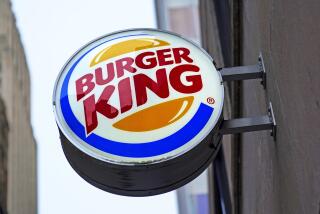States Question National Promotions : Ad Regulations Have Companies in a Pickle
State involvement in food advertising is driving many companies up the regulatory wall. It means “the possibility of having 50 individual states regulating food while we’re competing in a worldwide environment,” said David Hackney, spokesman for Campbell Soup.
Nevetheless, several states, particularly New York, have been active in questioning national food promotions, and there is every indication that the involvement will continue.
“It’s a high priority in this office,” said Lanie Accles of the New York state Attorney General’s Office.
A few of the most recent actions by states:
Orange Juice Case
--In 1987 Procter & Gamble agreed to pay California $350,000 because of its promotional advertisements during the test marketing of Citrus Hill Plus Calcium orange- and grapefruit-juice beverages in that state.
The lawsuit, filed jointly by the California attorney general and the Santa Cruz district attorney, alleged that the products were being promoted as “juices,” when they each contained only 60% real juice.
According to the County of Santa Cruz, the company admitted no liability or wrongdoing in a consent judgment, but agreed to clearly inform retailers of the specific percentages of juice in its beverages. The orange has been reformulated to contain 100% real juice.
--Maryland obtained an agreement with the Mid-Atlantic Milk Marketing Assn. that the association will refrain from future promotional campaigns advertising that whole milk is “less than 4% fat.”
Could Mislead Consumers
The campaign ran in Mid-Atlantic states.
Vik Khanna, a consumer-health advocate in the consumer-protection division of the Maryland Attorney General’s Office, said that the state believed that the ads would mislead the average person into thinking that whole milk is a lowfat food.
While the dairy product is 4% fat by weight, most of the beverage is water. Whole milk contains 8 grams of fat per cup and derives approximately 50% of its calories from fat.
In the agreement, the marketing association may advertise the fat content of whole milk by weight only if an equally prominent statement includes the fat content of milk by calories. The association, which had no comment, agreed to pay the consumer protection division $3,500 for consumer education.
--New York reached an agreement last with the Kellogg Co. over its Rice Krispies ads that claimed the cereal had “more energy-releasing B vitamins than ever,” and that as part of a good breakfast can “help give you some get up and go.”
Among the reasons the ads were misleading, the state attorney general stated, was that consumers would be led to believe that the B vitamins contained in Rice Krispies would give them added physical energy, vigor and power, and that consumers who experience fatigue owe those symptoms to lack of B vitamins.
The company, which admitted no liability or violation of the law, agreed to pay the state $10,000 for the cost of the investigation.
According to Kellogg spokesman Neil Niberg, the ads “accurately portrayed” the increased fortification level of B vitamins in Rice Krispies, and the effect they might have on consumers eating the cereal as part of a complete breakfast. Niberg added that the campaign was discontinued before New York even questioned it.
More to Read
Inside the business of entertainment
The Wide Shot brings you news, analysis and insights on everything from streaming wars to production — and what it all means for the future.
You may occasionally receive promotional content from the Los Angeles Times.









